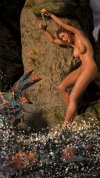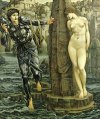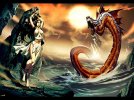Yes, I thought it was more 'in the style of'. But there are better reproductions on these websites - illustrating VIII: 57 ('And so the deadly custom commenced ... in the translation you've supplied):I was curious about this one. It doesn't look as detailed as Dore' and it looks more like a manip of a sea monster and a nude woman.
Dore' did do illustrations for an 1877 edition of Ariosto's "Orlando Furioso". Compare one of the known engravings (left) of Angelica being rescued by Ruggerio and the illustration in question (right).
View attachment 1221548View attachment 1221547
https://www.istockphoto.com/vector/...ck-sea-monster-fantasy-gm1174508276-326685150
https://www.poetryintranslation.com/PITBR/Italian/AriostoCantoVIII.php#anchor_Toc73457422
Thanks for posting that, Naraku! I didn't know that Ariosto located that part of the story in 'Ebuda' - that of course is the name recorded in Classical sources for 'the islands above Ireland' (Ptolemy) - in most sources in the plural - Ebudes, Hebudes, Aibudae etc., but in one ms of Ptolemy it's Ebuda. The English 'Hebrides' was a misreading, and probably a misidentification with the whole archipelago - in context the name sems to refer just to Rathlin (off the Antrim coast) and the southern Hebrides - Islay, Jura, Colonsay, Mull, and their smaller neighbours. In any case, just where I locate my Andromeda/ Angelica fantasies!Speaking of "Orlando Furioso":
Canto VIII: 51-61: Of Proteus and the tribute of maidens
Before I tell you more, I need to veer/ From my present course a little while.
For, if towards the West you were to steer/ Past Ireland’s coast, you’d come upon an isle.
Ebuda, it is called; scant folk appear/ On those shores, for the orca, we revile,
And other sea-creatures, denude the place:/ Old Proteus takes vengeance on that race.
The ancient legends, whether false or true,/ Say that once a powerful king ruled there,
Who had a daughter; she so fair to view,/ So graceful, tis no wonder that, whene’er
She was seen, Proteus would burn anew,/ Midst the waters, while she took the air,
And, finding her alone one day, defiled/ The helpless maiden, and left her with child.
This rape was a torment to the father,/ Viler, more impious than aught he knew.
No excuse, no pity, quenched his anger,/ Such was its force, against his own issue.
Nor did her state persuade him to defer/ Her punishment which he did swift pursue;
For he condemned her and the child to death,/ Before the babe had taken its first breath.
Now Proteus, who nurtures his great herd/ Of sea-creatures for the god of the sea,
Mighty Neptune, of her sad plight had word,/ And in his anger, quite unlawfully,
Against that isle his ocean monsters stirred,/ (Orcas, and sharks, and whate’er else may be
Lurking beneath the waves) to slay them all,/ Herds, flocks, and people, at his martial call.
And then in force he did assault the place,/ Each town or village, and lay siege around,
Where fearful and weary folk must face/ A tedious watch to secure their ground.
Abandoning their livelihoods, that race/ As a last recourse, then agreed to sound
The oracle, for counsel; by and by,/ It spoke to them, and yielded this reply:
That they must find a maiden in that land/ Who was equal in beauty to the other;
And offer her to Proteus, on the strand,/ In exchange for slaying the king’s daughter.
And if he thought her, once she was at hand,/ As fair, he would keep her, and no longer
Attack the isle; if not, they must provide/ Another, till that sea god found a bride.
And so, the deadly custom commenced,/ Whereby a maiden who was fair of face,
Was led to Proteus each day, from thence,/ Till one seemed pleasing, in her looks and grace.
The others were but prey, without defence,/ Fed to a giant orca, that kept place
Beside the port, and patrolled the shore,/ Till the sea god left the isle once more.
Whether the legend be false or true,/ (For there is none I know of who could say)
Such a tribute had been offered, when due,/ (A vile crime against woman) to that day,
Enshrined in law by that impious crew;/ The monstrous orca fed on maids, I say.
Though to be a woman brings, everywhere,/ Trouble and oppression, twas far worse there.
O unhappy maids whom misfortune brought/ To that unhappy land, and dire distress!
For that folk ever some stranger sought/ On whom to perpetrate their wickedness,
Since the more maids from elsewhere that were caught/ In their snare, by so much their toll was less.
Yet since the breezes oft brought none to shore,/ On every foreign strand they looked for more.
In frigates, galleys, in whate’er would float,/ They roamed about the seas, and gathered in
All the maids that they found, that seemed of note,/ To aid their tribute, dire as was the sin.
Some they took by force into their boat,/ Some by flattery, stealth, or gold did win,
And plundering thus, from the wider region/ Filled up every tower, and every prison.
Voyaging, one day, from land to land,/ They came upon that solitary shore
Where Angelica slept, upon the strand,/ Midst tufts of grass, but on a stony floor.
For water, and what wood there lay to hand,/ Those pirates landed, to refill their store;
Thus, the fairest flower of earthly charms/ They found there, in the holy father’s arms.

Last edited:






 )
)



